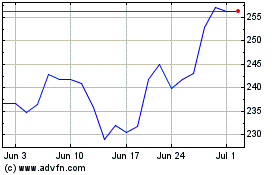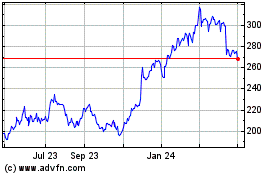By Chip Cutter
SEATTLE -- Minutes into a rehearsal of Mozart's overture to "The
Magic Flute" one recent evening, Amazon software development
engineer Hsing-Hui Hsu waved her arms from the box she stood on.
The music inside the fluorescent-lit conference room stopped.
"Play it at half of that dynamic, now half of that dynamic, and
now half that," she instructed dozens of colleagues sitting behind
their music stands. "Yeah!" she shouted as the volume dropped.
"We're in the final two weeks," she reminded them of the time
before their next public concert at the Amazon Meeting Center.
Nearly 500 people would be attending.
In the city that birthed grunge and was home to acts such as
Nirvana and Jimi Hendrix, the latest musical sensation is the
Amazon Symphony Orchestra.
With a repertoire ranging from Beethoven's Symphony No. 5 to
Disney's "Frozen," Amazon's nearly 100-employee orchestra is one of
a number of acts following in the corporate music-tradition of old
industry giants like Boeing Co. and Eastman Kodak Co.
Now, a new generation of company ensembles is getting the work
band back together: Google has its Google Orchestra and Salesforce
Inc. has an acapella group, "Cloudy with a Chance of Beatbox."
Sometimes, corporate ethos and music blur together.
The Amazon orchestra's board, all employee-musicians, often
bandies Amazon mantras such as "customer obsession" and "invent
tirelessly" in planning discussions, says Lauren Yu, a
software-development engineer who heads the orchestra's board and
plays the viola. Ms. Yu says the board sees its musicians as
customers.
After each performance, the Amazon orchestra sends its musicians
a survey asking them to rate the difficulty of each piece played
and their level of preparedness. The feedback helps the orchestra
choose the music lineup for its next concerts, says Ms. Yu.
Musicians come from all corners of Amazon's Seattle
headquarters, many of them former high-school band geeks or music
majors. Ms. Hsu, the conductor and director, studied clarinet
performance in college before training in coding. Some employees
not in the orchestra also are musically inclined: Dave Clark,
Amazon's senior vice president of operations, was a middle-school
band teacher in a prior life and played tuba and saxophone.
Some of its oboists are Amazonians orchestra co-founder Beau
Buchanan -- a technical account manager in his day job -- found by
forming a group on Amazon's internal directory called
#OboeYouDidnt. Christina Oaks, a technical recruiter who doubles as
first-chair flutist, says she brags about the orchestra whenever
possible, including while hiring.
"Even if it doesn't fit into the conversation, I'll sneak it in
if I can, " she says.
The group performs about four public concerts per year, mostly
free and at the Amazon Meeting Center.
Google's orchestra doesn't officially play to the public. Its
eight or so performances a year -- either in large meeting spaces
or on outdoor patios at the company's Mountain View and Sunnyvale
campuses in California -- have become hot tickets. Most
concert-goers are fellow Googlers, but some visitors have friends
or family who work at Google get them in, say those who have gone
to performances.
Like at Amazon, the Google orchestra uses regular surveys to
"shape our vision and culture," polling its musicians to understand
their motivations and which pieces they enjoy best, says Kay Saito,
a Google marketing analytics manager who plays flute and heads the
orchestra's board. "We love data," she says.
Some corporate-musical ensembles perform in service of their
companies. Cloud-software giant Salesforce's "Cloudy with a Chance
of Beatbox," formed in 2018, took the stage last year at
Salesforce's Dreamforce convention, an event that drew 170,000
customers and other attendees to discuss technology and hear from
speakers such as former President Barack Obama. The group performed
a rendition of Queen's "Somebody to Love."
It's understood that work can always interrupt the music. At the
Texas Medical Center Orchestra in Houston, some of the doctors and
other health-care professionals who belong have attended rehearsals
in bloody scrubs, says its Juilliard School-trained director, Libi
Lebel. On occasion, members have rushed out of rehearsal to attend
to a patient or deliver a baby.
The award-winning orchestra, which has performed at Carnegie
Hall as well as Houston Methodist Hospital's lobby, has become so
competitive for certain instruments that earning a spot in its
woodwinds section can take years of auditions, Ms. Lebel says. When
one physician didn't make the cut, he angrily emailed multiple
hospital executives to complain, she says. "Some people take it
very painfully," she adds.
Company musical ensembles date at least to the 19th century,
when coal mines throughout Britain had brass bands, many supported
by mining companies, says Jesse Rosen, chief executive of the
League of American Orchestras.
Some 20th-century acts still playing include the Boeing
Employees Choir, which went on a six-city tour across Portugal and
Spain this fall. It more regularly sings at Seattle-area retirement
centers.
The Procter & Gamble Big Band, started in the 1980s,
performs everything from Duke Ellington classics to songs from
Harry Connick Jr. and Michael Bublé, often in the lobby of the
company's Cincinnati headquarters, says Steve Glassmeyer, the
group's director and a project manager in corporate research and
development at P&G. The big-band swing group's showcase is an
hourlong concert on stage during the consumer product giant's
annual "Dividend Day," held at an Ohio amusement park and timed for
the company's dividend payout in the fall.
A few have outlived their corporate ties, surviving layoffs,
restructurings and funding cuts. The Kodak Concert Band, founded in
1980, keeps going today though nearly all of its members no longer
work at Eastman Kodak, says Donna Mero, a 35-year piccolo player
and the band librarian. The Hewlett-Packard Symphony Orchestra,
started by employees in 1993, split from the company in 2008,
changing its name the next year to "The Group Formerly Known as The
HP Symphony."
Now called the South Bay Philharmonic and still performing in
the San Francisco-area, the orchestra strives to embrace anyone who
wants to play, says George Yefchak, a former HP employee and its
current music director. "We never had any intention of being good,"
he says.
Amazon's orchestra aims for more. Surrounded by white boards in
the room where it rehearses two hours nearly every Tuesday, the
group was tackling a passage from Czech composer Bedrich Smetana's
symphonic poem "The Moldau." As Ms. Hsu cupped her hands and
whispered "shhhh," the music fell to a hush. During "The Magic
Flute" run-through, she urged the woodwind section to hit a note
"like you're striking a match," then recede.
The intensive preparation can pay off with high praise from fans
in the know.
Yet Ms. Hsu says some of her colleagues and Seattle friends
express shock the orchestra even exists, she says. "'They're like,
wait, you have a what?'"
Write to Chip Cutter at chip.cutter@wsj.com
(END) Dow Jones Newswires
January 27, 2020 13:28 ET (18:28 GMT)
Copyright (c) 2020 Dow Jones & Company, Inc.
Salesforce (NYSE:CRM)
Historical Stock Chart
From Mar 2024 to Apr 2024

Salesforce (NYSE:CRM)
Historical Stock Chart
From Apr 2023 to Apr 2024
